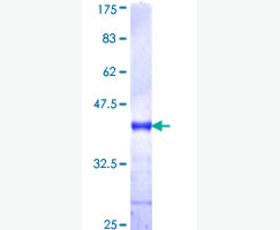Recombinant Human Eukaryotic Translation Initiation Factor 5A-2/EIF5A2
| Product name: | Recombinant Human Eukaryotic Translation Initiation Factor 5A-2/EIF5A2 |
| Source: | E. coli |
| Purity: | Greater than 95% as determined by reducing SDS-PAGE. |
| Buffer Formulation: | Lyophilized from a 0.2 μm filtered solution of 20mM Tris,150mM NaCl, pH 8.0. |
| Applications: | Applications:SDS-PAGE; WB; ELISA; IP. |
| Storage: | Avoid repeated freeze/thaw cycles. Store at 2-8 oC for one month. Aliquot and store at -80 oC for 12 months. |
| UOM: | 100ug/50ug/200ug/1mg/1g |
| Source | E. coli |
| Description | Recombinant Human EIF5A2 is produced by our E.coli expression system and the target gene encoding Met1-Lys153 is expressed with a 6His tag at the N-terminus. |
| Names | Eukaryotic translation initiation factor 5A-2, Eukaryotic initiation factor 5A isoform 2, EIF5A2 |
| Accession # | Q9GZV4 |
| Formulation | Lyophilized from a 0.2 μm filtered solution of 20mM Tris,150mM NaCl, pH 8.0. |
| Shipping |
The product is shipped at ambient temperature. |
| Reconstitution |
Always centrifuge tubes before opening. Do not mix by vortex or pipetting. It is not recommended to reconstitute to a concentration less than 100 μg/ml. Dissolve the lyophilized protein in ddH2O. Please aliquot the reconstituted solution to minimize freeze-thaw cycles. |
| Storage |
Lyophilized protein should be stored at < -20°C, though stable at room temperature for 3 weeks. Reconstituted protein solution can be stored at 4-7°C for 2-7 days. Aliquots of reconstituted samples are stable at < -20°C for 3 months. |
| Purity |
Greater than 95% as determined by reducing SDS-PAGE. |
| Endotoxin | Less than 0.1 ng/µg (1 IEU/µg) as determined by LAL test. |
| Amino Acid Sequence |
MGSSHHHHHHSSGLVPRGSHMADEIDFTTGDAGASSTYPMQCSALRKNGFVVLKGRPCKIVEMST SKTGKHGHAKVHLVGIDIFTGKKYEDICPSTHNMDVPNIKRNDYQLICIQDGYLSLLTETGEVRE DLKLPEGELGKEIEGKYNAGEDVQVSVMCAMSEEYAVAIKPCK
|
| Background | EIF5A2 is a member of the eIF-5A family. It is a 153 amino acids protein that in humans is encoded by the EIF5A2 gene. EIF5A2 is expressed in ovarian and colorectal cancer cell lines and highly expressed in testis.It has an important function at the level of mRNA turnover and mediates effects of polyamines on neuronal process extension and survival. It plays an important role in brain development and function, and in skeletal muscle stem cell differentiation. |














